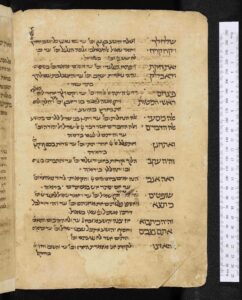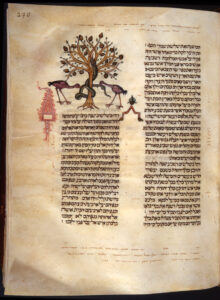In all modern communities, the standard practice is that on the three Shabbatot before the Ninth of Av and the seven after it the standard haftarah is replaced. Before the Ninth of Av they are replaced with haftarot of rebuke, from Jeremiah and the opening of Isaiah, and after they are replaced with haftarot of consolation from the later parts of Isaiah. Rambam’s Mishneh Torah, though, preserves a very different custom, one where each one of those Torah portions has an associated haftarah, related not to the calendar but to the parashah itself. Here the editor has compiled a list of these haftarah readings, along with brief notes to explain their connection with the parashah.
| Parashah | Haftarah | Connection | Recording |
|---|---|---|---|
| Mattot (Numbers 30:2-32:42) | Joshua 13:15—14:5 | discusses the apportioning of land to the trans-Jordanian tribes | |
| Mas’ei (Numbers 33:1-36:13) | Joshua 19:51—21:8 | cities of refuge and the Levite towns | |
| D’varim (Deuteronomy 1:1-3:22) | Jeremiah 30:4—30:22 | linguistic similarities, making an end to the earlier nations | |
| Va-etḥanan (Deuteronomy 3:23-7:11) | Jeremiah 32:16—32:44 | begins with pleading to God that goes unanswered, danger of idolatry | |
| ‘Eqev (Deuteronomy 7:12-11:25) | Jeremiah 2:2—4:2 | Idolatry as adultery, withholding rain for sin, but hope in repentance | |
| Re’eh (Deuteronomy 11:26-16:17) | Jeremiah 23:5—23:24 | false prophets, abominable things | |
| Shoftim (Deuteronomy 16:18-21:9) | I Samuel 8:1—8:22 | appointing of judges and kings | |
| Ki Tetsei (Deuteronomy 21:10-25:19) | I Samuel 17:1—18:14 | going out to battle with faith | |
| Ki Tavo (Deuteronomy 26:1-29:8) | Joshua 8:30—10:14 | blessings and curses ceremony, exhortations against fear | |
| Nitsavim (Deuteronomy 29:9-30:20) | Joshua 24:1—24:13 | assembling the people for a final retelling of history | |
| Ha’azinu (Deuteronomy 32:1-52) | Ezekiel 17:22—18:34 | eagle imagery, reward and punishment, live and not die |
Maimonides’ list of Haftarot for each Parashah can be found in his Mishneh Torah, Seder Ahavah, Laws of the Order of Prayer. Different pages and variations exist for the various editions published. In his authoritative, hand-signed copy, held in the collection of the Bodleian Library, this information can be found on folio 184v of MS Huntington 80. –Aharon Varady
Source(s)

“Alternative Haftarot for Those who Do Not Recite the Haftarot of Rebuke and Consolation” is shared through the Open Siddur Project with a Creative Commons Public Domain Dedication 1.0 Universal license.





Leave a Reply